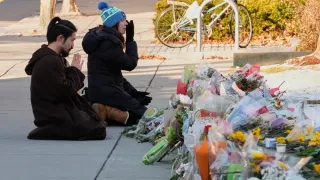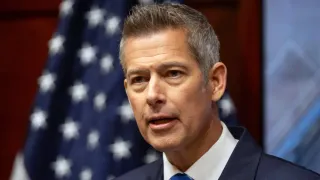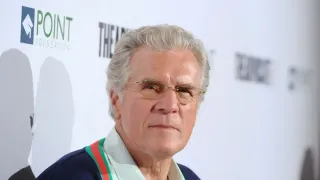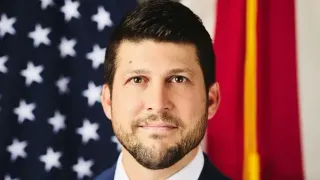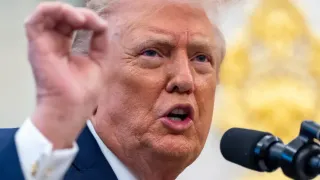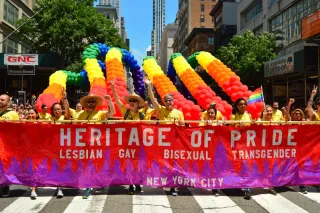June 22, 2015
Aussie Lesbian Crime Flick 'All About E' Hits Film Fests
Winnie McCroy READ TIME: 12 MIN.
The international premiere of "All About E," hits film festivals this month, from the prestigious Frameline Film Festival in San Francisco on June 22 to Outfest in Los Angeles on Sunday July 12.
Louise Wadley directs Mandahla Rose and Julia Billington in this sexy, funny, rollicking Aussie crime film with strong lesbian characters and a rollercoaster plot that weaves in complex issues about identity, family and sexuality.
"We are thrilled to bring 'All About E' to Frameline and Outfest and hope American audiences will enjoy and connect with the story and character as they did in Australia," said Wadley. "While definitely a rollicking adventure, 'All About E' is also a film that touches on so many issues LGBT people face in real life and also gives voice and visibility to diverse lesbian characters, still something we do not see enough of in film."
"All About E" enjoyed its Australian premiere in February at the Mardi Gras Film Festival with an 800-seat sell out. It also screened to another sold-out crowd at Melbourne Queer Film festival on March 29. "All About E" is Girls' Own Pictures' first feature film, crowdfunded with $94,000 raised by the most successful Pozible campaign for an Australian feature film.
EDGE: What inspired this film?
Wadley: This film was inspired by many things: people who seem to have it all; the masks we wear to survive; fear of our true self; fear of failure as an artist; and music. Music is hugely important to me. E's journey with her music of course reflects the journey of herself. And music often expresses what we can't say and E is often in that place of not being able say what is going on for her.
I wanted to create complex heroines who have a lot going on. I wanted to make a film that was really entertaining but that that had lots of layers and was also about something real. And I love road movies because characters are forced to face challenging situations (and therefore themselves). People have called "All About E" the Lesbian "Priscilla" and I am really happy with that. I love movies like "Priscilla: Queen of the Desert" and "Muriel's Wedding" because although they are really entertaining romps they are actually quite subversive and dark in parts.
Lesbian films have not always been the best and in some weird throwback to the Victorian novel they often require the main characters to be totally miserable or die. I vowed to not do that in my film. I wanted people to come out happy and uplifted.
Having said that, I wanted to explore identity and family, inter-generational conflict and marginalization, alienation and the desperate need to belong. I wanted to show the complexity of our lives and the way this is exacerbated with each added layer. More importantly, I wanted to show the masks and strategies we develop as lesbians to survive in a dominant culture.
E's character, being an "other" both as a lesbian and Arabic person in a dominant Anglo culture like Australia, her life both past and present, I hope all those things clearly portray the impact of these issues. And I wanted to do something around the experience of the city/country dichotomy that we have in Australia.
We are such an urban people but we hold this rich deeply held romantic notion of being a rural country at heart. I wanted the film to give the audience an insight into the parallel experiences of rural living through the role of Trish. When I say it is about identity it is as much about Australian identity -- E and Trish are different parts of that Australian Identity.
EDGE: Tell me about THAT sex scene.?
Wadley: Sex scenes are always scary for directors no matter what your orientation, but lesbians haven't always been blessed with good sex scenes. So the sex scene in "All About E" was something I cared about a lot. I wanted it to be good, very good. But I also had a list.
First, it needed be passionate and beautiful and very strong but I didn't want it to be just one of those lust falling over ripping off your clothes breaking the furniture scenes (although they are great in the right place). And in my film it is important that it is a very big passion. So when the scene arrives, people really want it to happen.
Secondly, I wanted the audience to know by what was happening that these two knew each other well, that they had a history but it was still very HOT. So I thought about it a lot. I talked to a bunch of people. I watched a lot of sex on screen! I soon found out that there were many things I did NOT want this scene to do.
Thirdly, I knew I had to get it right -- this stuff is particularly important to women as they discover their sexuality, because of course, once you decide you are a lesbian, what do you do? You look up every lesbian movie made, that's what you do. So this was going to be on the shelves for a long time. It had to be good!
Many people have said it is the best sex scene they have ever seen. I'm proud of that, especially for a low budget film with so many time restrictions. It was the very first scene I had to shoot when we arrived in the country. This meant the actors playing Trish and E had to shoot out of sequence and create this intense moment that is much later in the story. We had so little time and because we were filming in the outback it was so hot! I mean I am talking over 110 to 115 degrees in the room. The camera actually broke.
My wonderful DOP had sweat dripping into her eyes all the time and the focus puller had sweat raining down from his face. I'm very proud of everyone. Anyone who watches the film will agree: it was worth it.
EDGE: It seems to blend aspects of buddy comedies with a classic road film; talk about how these parts work together.
Wadley: I wanted to do a story that had a lot of complexity, and E provides that. Matt and E's relationship gave me such wonderful opportunities to explore things that we don't see much, like the close friendship between a lesbian and gay man. Matt was so much fun to write -- he gets all the best lines. I loved flipping things on their head and making the girl the love rat and the boy the hopeless romantic.
E's a bad girl but that's not all she is. When we first meet E, it seems like that she has everything, she is a headlining DJ at a top nightclub, girls throw themselves at her, she has a gay best friend who puts up with her bad behavior and is her own personal designer, but we soon learn that she is not really inhabiting the world, she wears a mask to survive. I wanted to take a character who people might think they know at the beginning, and slowly reveal that this is why she is like she is.
EDGE: Discuss some of the issues around race in Elmira's Lebanese ancestry; how does that complicate matters?
Wadley: The relationship between E and her parents and in particular her mother is very important to the story. It is not as simple as E is a coward for not being out to her parents. As a child of working-class immigrant parents who have sacrificed everything so that she can go to university, E carries the expectations of her whole extended family. She becomes the sole conduit for her mother's hopes and dreams and the pressure is just too much for her.
When we first meet E she is trying to assert her individuality by rejecting her family identity and her music, but of course this is killing her inside. The irony is that despite everything E does to hide her sexuality in order not to disappoint her parents, her mother still tells her "you're killing me with what you do to us."
E has to learn to face her demons head on so she can integrate her identity properly and live her own authentic life. I think many people, whatever their ethnicity or cultural background, can relate to this. But being Lebanese definitely adds complications for a relationship with someone like Trish who feels hurt and shut out by E's deceptions and her unwillingness to tell her parents about her. Trish's job as a character is to push E and to challenge her. But I think that many people can relate to E and the pressures she feels from her parents. Many, many, different people have come up to me or contacted me and thanked me for that.
EDGE: How would you describe the relationship between E and Trish?
Wadley: Complex! My favorite word!
EDGE: Why does Trish accept E back in her life, even after the lies continue?
Wadley: First of all -- these two women are incredibly attracted to each other. And Trish needs E as much as E needs Trish. Trish provides that moral compass that E is drawn to. E's creativity and wildness is what Trish is drawn to, and her incredible potential if she were able to fulfil that. But our strengths are often our weaknesses and Trish is a very rigid person who sees everything as black and white. She can't see the grey.
E of course lives in the grey. When she arrives back at Trish's, E is struggling with herself and trying to work out what she should do. This time in the country is very important for E -- it is where she will finally have to face herself and decide what it is she wants and who she is. They both have a lot to teach each other.
EDGE: The film seems to take a noir turn in the discovery of a stolen bag of cash. What influenced this subplot?
Wadley: I'm glad you picked up on that. Noir is a genre that really allows women to be more complex and to transgress. Think of all the heroines that are badass and some of the most enduring are those screen noir film Fatales that actors like Lauren Bacall played. The genre allows for them to make bad choices and do things that the audience goes "Oh-oh, don't do that" -- we know it is going to end badly but most importantly their characters are dangerous and they disrupt things, change the narrative up. I wanted E to have a part of that but I was aware that I wasn't making a retro piece -- she is also a contemporary heroine who reflects an all too often under-represented constituency in Australia. This bag of money also set them off on the road trip.
EDGE: Who do you hope sees this film, and what kind of impact would you like it to make?
Wadley: I really want this story to be seen as widely as possible. I very deliberately made a film that speaks to lesbians. They are hugely under-represented in storytelling generally.
I have been very touched by the response I have had from all sorts of people who have felt compelled to tell me how affected they were by the film. And I am talking about a really wide range of people, of all ages, genders, ethnicities and orientations. That is the goal of every filmmaker -- to find that magical intersection between the specific and the universal. You are trying to create a film that has enough space for the audience to see themselves in it.
In "All About E," every character, location or situation allows multiple opportunities for the audience to relate to the story and insert themselves into the narrative. This response has humbled and thrilled me.
As a lesbian I am expected to consume and relate to culture everyday that makes me invisible. I want to make interesting and challenging films that put "the other" at the forefront of the action and people don't feel the need to remark on it -- they just go "yeah I loved that film.
In terms of impact, I particularly want this to be just one of many Australian films that reflects the true diversity of our culture and allow many more interesting and complex female protagonists.
EDGE: Was it hard to work with your partner?
Wadley: Jay and I have been partners for 29 years so we knew we were a robust partnership, but making a film is so hard. I am so lucky to have someone like her as the producer. Not just because she is a genius with spread sheets and fearless in tackling logistical problems, but also because of the creative journey that we have taken together. It was very important that this was our project, our baby. We are very proud of it.
EDGE: Music seems very important to this story.
Wadley: Yes, music is central to this film. E is a classically trained clarinettist and she struggles with her internal identity and the musical journey mirrors her own journey. So we have everything from club music to pop to classical to Middle Eastern music reflecting E's journey. I was blessed with many wonderful musicians who came together for this project especially my fabulous composer Basil Hogios, who said as the child of Immigrant parents he had been waiting for an Australian film like this for years. The personal touch he brought to it is really beautiful.
The other person who brings his musical genius to the production is international oud maestro Joseph Tawadros. Being an Egyptian Australian, his original music was so important to reflect E's internal self. Basil and Joseph are good friends and play together so Basil was able to incorporate Joseph's music into his original composition and to have the clarinet played in a way that was not straight classical style but "bending" the note as they do in the Middle East and Greece etc. I hate music films where you can tell the actor is not even close to playing the musical instrument you see on screen. I was lucky that Mandahla is very musical and although she did not play the clarinet, she played the flute she worked extremely hard to make it completely natural.
For more information about "All About E," visit https://www.facebook.com/AllAboutEmovie
